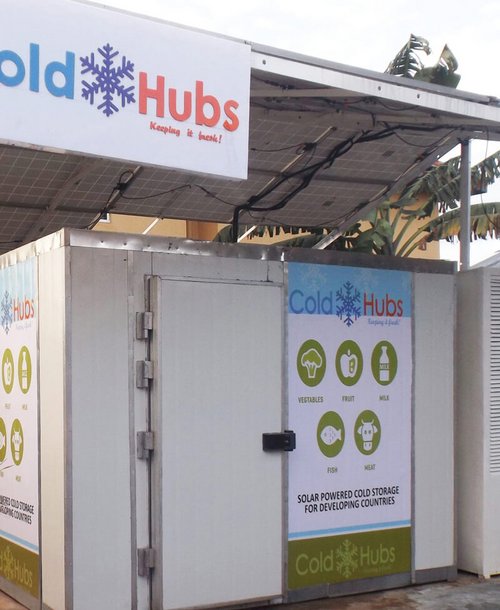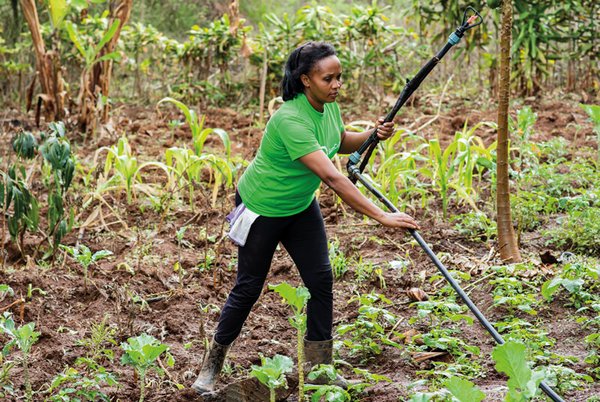 Download this article in magazine layout
Download this article in magazine layout
- Share this article
- Subscribe to our newsletter
Boosting food system energy efficiency with private sector innovations
Today’s food production consumes 30 per cent of the global energy resources and is responsible for more than half of the greenhouse gas (GHG) emissions. To feed the growing world population, food production would have to be increased by 60 per cent until 2050, consequently requiring a significant increase in energy consumption. Agricultural food systems and energy are strongly intertwined, and therefore, there is an urgent need for innovative approaches to produce more food with fewer resources. In this context, the role of the local private sector is crucial to disseminate integrated solutions for a fair transition and sustainable development. Small and medium enterprises (SMEs) play a significant role here. Through the dissemination of innovations, they can enhance options for actions to foster sustainability, boost development, dynamise the regional economy and increase resource use efficiency.
Partnerships for sustainable agri-food systems transformation
SMEs in the water-energy-food nexus in Africa and Asia are bursting with innovative technologies and ideas. Their innovations range from solar-powered irrigation and cooling technologies to organic fertiliser and inclusive business models. The companies are also directly connected to the end-users of their innovative products – they maintain strong links to smallholder farmers and understand their concrete challenges and needs. Therefore they have the potential to boost a path towards sustainable agri-food systems transformation. By using smart innovations and climate-friendly practices, farmers and food companies can enhance climate resilience, reduce CO2 emissions and support the goal of limiting global warming to 1.5 degrees Celsius.
However, SMEs often have too little access to finance and opportunities to develop their capacities and business plans. At the same time, they frequently lack appropriate institutional and political framework conditions which could help them to grow up and extend their services and products. This is where the Water and Energy for Food (WE4F) initiative (see Box) comes in. It supports innovative approaches at all levels of the water-energy-food nexus (local, national, regional and global) and connects farmers, businesses, investors, governments, researchers and other stakeholders to open dialogue and communication between the development and the private sector.
Through the work of two Regional Hubs (see Box), the programme assists innovators via partnerships and a range of different activities, such as improving access to finance, investor matching, technical advice, results-based financing, knowledge dissemination and co-creation. At the same time, the programme supports capacity building for the end users of the innovations, the creation of appropriate finance options for access to innovations as well as the improvement of institutional and political framework conditions. Through the involvement of different stakeholders, barriers hindering the adoption of innovations are to be eliminated and a vibrant local economy and environment for the innovators to thrive in is to be created.
Promoting energy efficiency in agriculture
Energy is a driver of economic growth and social development. Harnessing the potential of sustainable energy is a prerequisite to achieving inclusive green growth and strong agri-food value chains. In 2021, the WE4F Regional Innovation Hubs (RIHs) organised regional and national Calls for Innovations to create new partnerships with local SMEs requiring support in scaling their sustainable and innovative solutions. Around 45 innovators were selected and are now carrying out different activities with the RIHs to promote energy-efficient agricultural practices in the respective regions. Some examples:
In East Africa, WE4F supports the acceleration of Kenya’s progress to net-zero emissions and the deployment of renewable energy, enhancing the resilience of the agriculture sector to the effects of climate change. One innovator contributing to this commitment is SunCulture. This Kenyan company develops and commercialises solar irrigation systems in both East and West Africa, where currently only three per cent of the agricultural land is irrigated. SunCulture provides smallholder farmers an affordable and climate-friendly way to increase their yield, cultivate more profitable crops and adapt to the changing climate and corresponding droughts. In addition, the company uses a PayGo Model that allows smallholder farmers to pay in instalments, giving them a chance to acquire a pump with less upfront payment.
Another good example is Kenya’s Mace Foods, a women-led company producing, processing and marketing chilies and traditional African leafy vegetables. Mace Foods aims to bridge the demand and supply gap between the rainy and dry seasons with its own processing plant, using solar-powered processing technologies. It is collaborating with a majority of women farmers and also employs women in production, as Mace Food’s Production Manager Peter Okello emphasises: “Being a woman-owned entity, we make conscious decisions to have more women employees.” As the company occasionally runs into shortages of vegetable, Mace Foods and SunCulture decided to collaborate to cope with each other’s challenges. SunCulture farmers are now producing high-quality chilies on six hectares of land, which Mace Foods then purchases to process them with a solar drying technology.

The walk-in solar-powered cold room containers help preventing food losses. Photos: WE4F
In West Africa, the WE4F Regional Innovation Hub joined forces with Cold Hubs, an innovator from Nigeria that offers solar cooling solutions. In many parts of Nigeria, refrigeration is uncommon because of unreliable local power grids. This is where Cold Hubs come in with their 100 per cent solar-powered cold rooms suitable for farms, processing units and food markets. Cold Hubs offer a 24/7 off-grid storage and preservation of perishable foods with a flexible pay-as-you-store subscription model. Cold hubs are installed in major food production and consumption centres (in markets and farms) where farmers store their produce in clean plastic crates for which they pay a daily flat fee. This extends the freshness of fruits, vegetables and other perishable food from two days to about 21 days. Hence, post-harvest losses are prevented and greenhouse gas emissions will be reduced, while energy is being saved.
The Regional Innovator Hub South East Asia, operated by USAID, employs a similar approach and supports a variety of SMEs including Husk Power Systems in India. Husk innovators discovered that biomass gasification – utilising biomass waste, such as rice husks, maize and cobs – can deliver reliable and 100 per cent renewable energy to rural households and agricultural enterprises. By combining the biomass gasification system with a solar photovoltaic system, the innovation powers a mini-grid that produces electricity for residential as well as agricultural needs. Husk Power offers customers a flexible “pay-as-you-go” energy service, using a mobile-enabled smart metering system. In this way, the company allows rural, off-grid communities to benefit from more productive hours in the day, creating choice and improving their quality of life.
An enabling environment is key
The dissemination and scaling up and out of climate friendly water, energy and food nexus innovations requires an enabling environment and long-term partnerships. Innovative enterprises are invited to participate in different events and alliances and share their solutions. This allows them to promote their innovations and learn from each other, build networks and partnerships and access information. While raising awareness for the transformation needed in our food systems, the events enable the activating of different partners and stakeholders in the water, energy and food nexus. The topics addressed include solar-powered technologies as game changers for a just energy transition, the transformation towards climate resilient food systems, food and water security and the importance of access to finance for the private sector in sub-Saharan Africa.
Since the Initiative started in 2020, through innovative solutions in East and West Africa nearly three million litres of water and 30 million kilowatt-hours of energy have been saved. And in future, together with its international partners WE4F will be driving change towards fairer and sustainable development.
The international initiative “Water and Energy for Food (WE4F) Grand Challenge” is funded by the German Federal Ministry for Economic Cooperation and Development (BMZ), the European Union (EU), the Ministry of Foreign Affairs of the Government of the Netherlands (MFA-NL), the Swedish International Development Cooperation Agency (Sida), the Norwegian Agency for Development Cooperation (Norad) and the US Agency for International Development (USAID). On behalf of these donors, activities are implemented through Regional Innovation Hubs (RIHs) of two implementing agencies: GIZ with RIHs in West and East Africa and USAID with RIHs in the Middle East-North Africa, Southern and Central Africa and South and Southeast Asia.
Noémie Tokplen is a junior specialist in communications, event management and monitoring for WE4F at the GIZ secretariat in Bonn, Germany. She obtained her B.A and M.A. in literature, language, culture and media studies in Bonn, Freiburg, also in Germany, and Paris and Lyon in France.
Kilian Blumenthal is technical advisor for WE4F in the East Africa Hub based in Nairobi, Kenya. He holds a B.Sc. in Environmental Engineering of the HAW Hamburg and an M.Sc. in Agricultural Sciences in the Tropics and Subtropics of the University of Hohenheim, Germany.
Sten Schurer is junior technical advisor for WE4F at the GIZ secretariat in Bonn. He obtained a B.Sc. in economics and earth sciences of the VU Amsterdam and a M.Sc. in Water Management from the Technical University Delft, both in the Netherlands.
Matteo Jaeckels is an Intern for WE4F at the GIZ secretariat in Bonn, with a B.A. in Social Science and Sociology at the University of Bielefeld, Germany, and a Masters Candidate in M.A. in International Development at the Science Po Paris & University of Vienna, Austria.
Contact: marina.kosmus@giz.de





Add a comment
Be the First to Comment